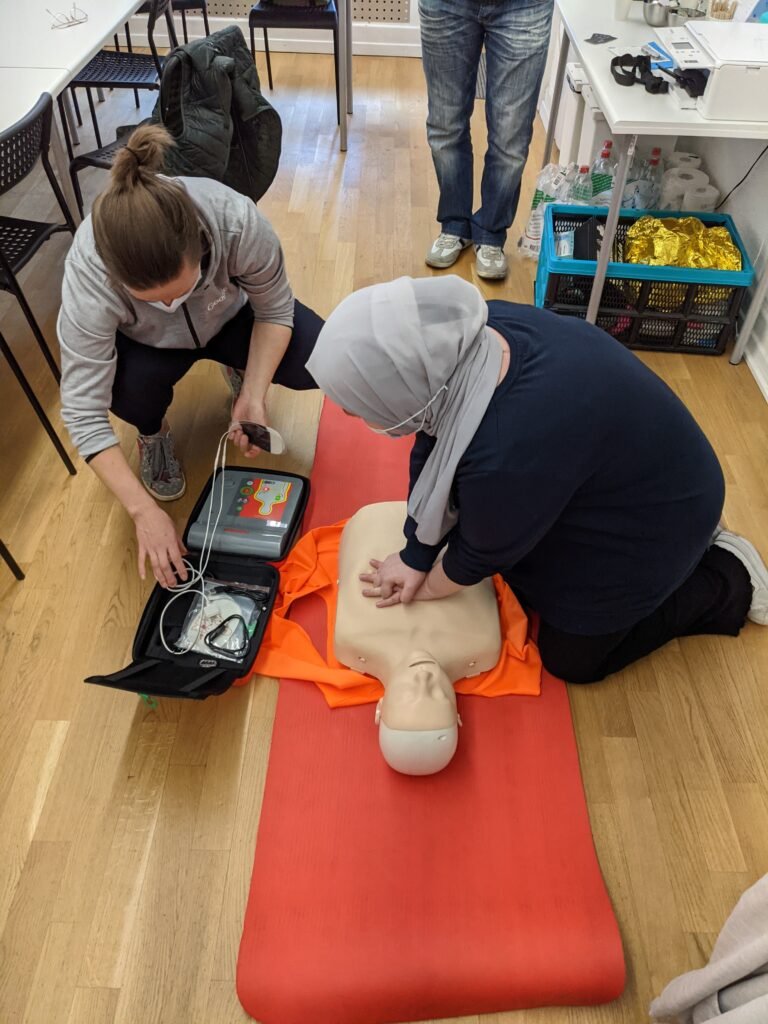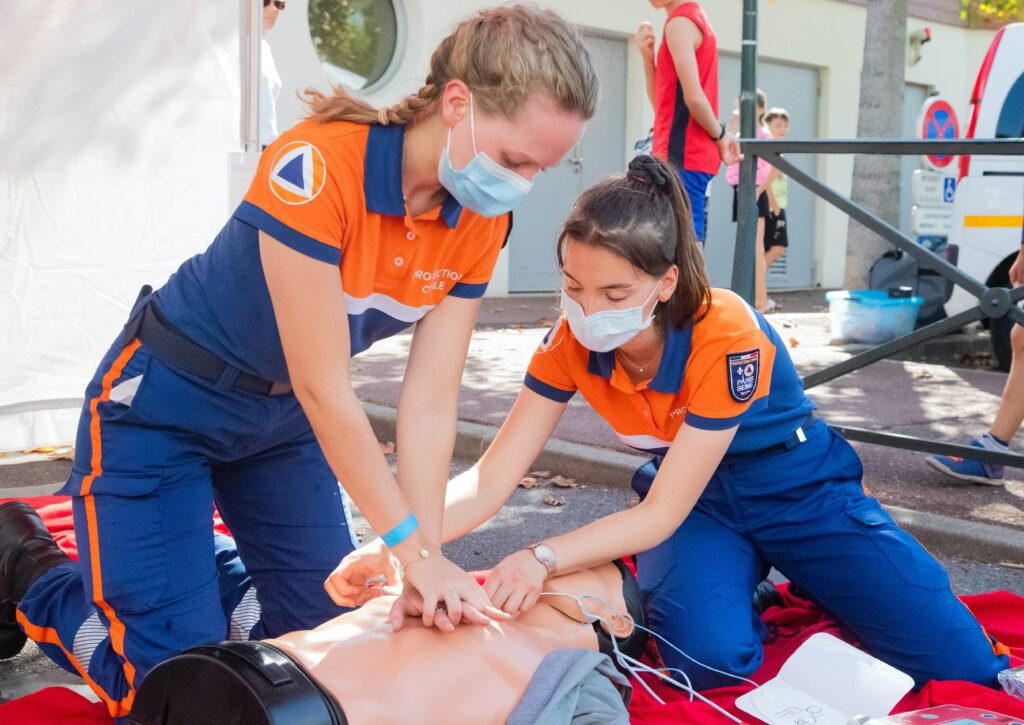“Being trained in CPR means having the power to give someone a second chance at life” – Unknown
Life is unpredictable. It can present us with an opportunity to give someone a second chance at life. So we need to be prepared and equipped with the skills to respond to an emergency situation. The story of a man named Smith emphasizes the importance of this life-saving skill: Basic Life Support.
Basic Life Support Skill in Action!
This supposedly healthy man had recently faced some life’s challenges. He just experienced sudden business failure due to the economic downturn in his country. Just like many other businessmen, he has been under intense pressure to pay back business loans and other financial obligations facing him. This took a toll on his health as he noticed increased heart rates, raised blood pressure, etc. He ignored these symptoms and carried on with his life, focusing only on how to bring himself out of his financial quagmire.
On one Tuesday morning, while he was at the bank for some transactions, before he could reach the teller, he slumped and passed out. Smith had suffered a Cardiac Arrest! His story would have had a tragic ending if not for the timely intervention of another customer who has received BLS training and is experienced in giving CPR (Cardiopulmonary Resuscitation). She performed CPR on him, giving 30 chest compressions with 2 rescue breaths while other customers had called the ambulance. Thankfully, Smith jumped back to life and started breathing again.
What is Basic Life Support
Basic Life Support (BLS) refers to the type of care that healthcare providers, first responders, and public safety professionals provide to anyone who is experiencing cardiac arrest, respiratory distress, or an obstructed airway. This First Aid care can also be provided by bystanders who are experienced in BLS in an emergency situation before medical help arrives. BSL confers on a person the ability to recognize and respond to life-threatening emergencies when someone is unresponsive, choking, or suffering a cardiac arrest.
A person who has acquired basic life support skills will be able to respond appropriately in the following circumstances:
- Sudden Cardiac Arrest (SCA). This is when a person’s heart is obstructed as it pumps blood. This makes it hard for blood to get to the brain, lungs and other organs. This usually happens spontaneously and without warning. A cardiac arrest usually causes the victim to stop moving, show signs of irregular breathing and/or become completely unresponsive.
- Heart attack, stroke and Foreign Body Airway Obstruction (FBAO): Being able to recognize and differentiate when someone is having a stroke, a heart attack or choking due to obstruction of the airway by a foreign object is crucial to providing the needed emergency intervention to keep them alive until professional help arrives. BLS skills will help you become knowledgeable about these situations as well as be able to offer useful help to victims
What to do in a Medical Emergency
The following interventions when delivered promptly and correctly can save a person’s life:
- Cardiopulmonary Resuscitation (CPR): This is a life-saving medical procedure that is used on patients who are suffering from cardiac arrest. When the heart is unable to pump blood, this procedure pumps blood around the bodies of victims so that their vital organs can continue to receive blood and oxygen. This involves giving 30 heart compressions with 2 rescue breaths. This procedure can resuscitate an unresponsive victim. For CPR to be successful, the following factors must be ensured:
- The scene must be clear and safe.
- Find out if the person is unconscious by tapping or shouting at him or her
- Check for breathing by putting your ear near the victim’s mouth and nose area and checking if the chest is rising and falling
- If not breathing, do 30 chest compressions and 2 rescue breaths. Repeat this procedure until the victim revives or professional medical help arrives. You can also use an AED if available when the victim has no pulse as this will deliver an electric shock which may revive the person
- Defibrillation with an Automated External Defibrillator (AED). This is a portable device that can be used to save the life of a person experiencing a sudden cardiac arrest. While it comes with step-by-step instructions on how to use it, making it possible even for anyone without any BLS training to use, It is however beneficial to get training on its use to know how it works and be more efficient in using it in an emergency

Benefits of Acquiring a Basic Life Support Training
The benefits of acquiring BLS skills cannot be overemphasized. As can be seen from the story of Smith at the beginning of this article, having this skill can be the difference between life and death. Below are 5 benefits of having BLS skills:
- It Saves Lives: This is the most critical benefit of having the Basic Life Support skill. In the case of an emergency, prompt BLS skill intervention such as CPR and AED can resuscitate an unresponsive person and give them a second chance at life
- It Build Confidence and Promotes Self-Esteem: When you are sure that you have the necessary skills to help a person in an emergency or save a life, it builds confidence in you and promotes your self-esteem when you put your skill to use successfully.
- Builds Your Expertise in Performing CPR: Cardiopulmonary Resuscitation is a critical life-saving skill that everyone should have in and outside a health facility. BLS will help you safely administer CPR without endangering your life and that of the victim. You will be able to ascertain if the situation allows for safe administration of CPR. You would thus be able to perform CPR without causing more harm to the victim or yourself.
- Helps You Become Efficient in the Use of AED: As stated earlier, AEDs come with instructions on how to use them. However, getting training on its use will help you understand how it works. This in turn, will assist you in efficiently using it to save lives in the cases of cardiac emergencies.
- It Promotes Sense of Safety: When you have BLS skill, you and those around you will feel safer because they know that you possess the skill and expertise to help them in the case of medical emergency
- Enhances Career Growth and Earning Potential: BLS skill certification can open up opportunities for career growth. It is a necessary skill for certain types of jobs such as first responders, care and support work, etc. While employers are happy to provide BLS training to their staff, you are at an advantage if you already have the skills as this will save cost and time for them
Summing it All Up
From this article, we’ve seen what Basic Life Support Skill is and why it is a must-have skill. We saw its importance in the story of Mr Smith. By all means, acquire this critical life-saving skill and position yourself as “life saver capable of giving others a second chance at life!” At Balance of Creation Elearning, we have over 80 healthcare courses including Basic Life Support Course designed and delivered by experienced healthcare professionals to help you achieve learning goals. Checkout our courses on www.balanceofcreation.online to get started. Don’t wait; take action today to make a difference. Together, we can create safer and healthier communities.






